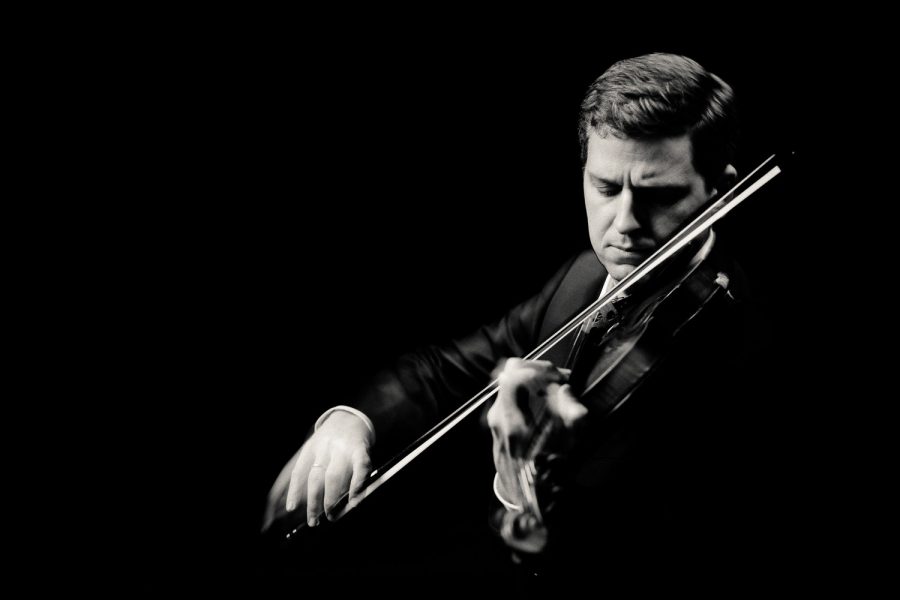A brief interview with James Ehnes
James Ehnes, a Canadian violinist, has won numerous awards, including two Grammy’s.
January 17, 2020
Canadian violinist James Ehnes is considered one of the most gifted violinists of his generation. On Jan. 14, Ehnes performed Beethoven Violin Sonatas numbers 5, 6 and 9 with pianist Andrew Armstrong at the Maltz Performing Arts Center. It was the second portion of a three-part cycle concert cycle through the Cleveland Chamber Music Society.
Born in the small Canadian city of Brandon, Manitoba, Ehnes rapidly emerged as one of Canada’s greatest musical talents. He made his orchestral debut at the age of 13, and released his first recording of the Paganini Caprices while still a student at the Juilliard School. Since then, he’s won two Grammys and has even been inducted into the Order of Canada.
We got in contact with him before the concert to discuss his background, how he champions contemporary music along with classical pieces and a few other aspects of his career as a performer.
We both grew up in Brandon, Manitoba, around the faculty at the Brandon University Music School (which has the great acronym of BUMS). How do you think that upbringing affected you as an artist and performer?
I owe a very great deal to Brandon University. Though I left Brandon at the end of high school, the School of Music was like my second home, as my father was the trumpet professor there and his colleagues were like my extended family. I was very lucky to have Francis Chaplin as my violin teacher, a legendary figure in Canadian music and one of the most influential people in my life.
You’re coming to Cleveland as a part of a performance series of Beethoven’s Violin Sonatas. Do you prefer these sorts of chamber performances with pianists like Armstrong, or the big ones with great orchestras and concerti?
I can’t really compare them! I like to keep a varied schedule, with concerti, recitals with piano, solo violin recitals, quartet concerts, mixed chamber music, etc. Each one of these things makes me better at the others, I think. They each have their challenges and their specific rewards.
When was the first time you studied any of the Beethoven sonatas?
The first Beethoven sonata I played was Op. 30 No. 2, when I was about 13. My teacher, Francis Chaplin, gave me a beautiful edition of the complete set as a Christmas gift—I still have it.
Which recordings or renditions of the Beethoven sonatas were especially influential for you as a young artist, or even to this day?
I listened to many recordings over the years, though I suppose the performances that I heard the most as a student were Perlman/Ashkenazy and Heifetz/Bay/Smith.
How do you try to make your performances of these sonatas, which have been interpreted countless times, individual and personal to your artistry? Have your interpretations changed dramatically as you’ve grown as a performer?
I think it’s always a bad idea to try to make an interpretation “individual and personal.” If one plays with complete honesty and integrity, it will sound personal because each person is different. It is the player’s responsibility to play a piece the way they think it needs to be. A performer can never know whether a particular audience member will find that interpretation “standard,” or startlingly original.
As far as if my interpretations have changed, I’m sure they have. But I wouldn’t be a good judge of that; my thoughts about the pieces haven’t changed radically, but I have, of course, changed as I’ve gotten older—so I’m sure the interpretations have evolved as well.
You’ve championed a lot of contemporary pieces, some of which were commissioned for you. Are there any other contemporary or maybe some “unorthodox” compositions that you haven’t gotten to perform yet, but someday hope to?
Many! There are so many wonderful pieces being written it’s impossible to keep up! And there are even some fairly standard pieces, like the Szymanowski concerti, that I love but just haven’t gotten around to yet.
How did the music school grind challenge you, especially during juries (your version of finals week)?
I wouldn’t say my studies at Juilliard were particularly a grind. My favorite parts of my Juilliard experience were my private lessons, chamber music coachings, the incredible ear training teachers and the orchestra. But, the most lasting legacy of my time there is the friendships that I’ve kept for decades. Some of my closest friends and colleagues are people I met at school.
If you weren’t able to catch the Jan. 14 concert, the last in the series will be on April 21, where he will perform sonatas number 8, 7 and 20. For students, tickets are only $5, meaning there is little excuse not to go. There’s even a pre-concert lecture, so you can call it “studying.”
Opportunities to see great performers aren’t exactly rare by virtue of our proximity to Severance Hall; however, seeing one of Ehnes’ caliber in this setting is certainly not one to miss.



